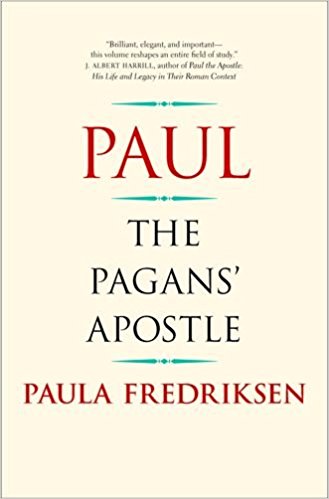The chapter on Paul and the Law is both interesting and strange (pp. 95-130), it is interesting because it deals in some detail with what Paul says about the Law (emphasizing texts like when Paul says in Rom. 3.31 that he does not overthrow the law, he upholds it, and rejecting Barclay’s detailed argument in Paul and the Gift that since the Christ event the Mosaic covenant was like a defunct currency). Amazingly, she wants to argue that the whole blow up in Antioch and withdrawal from table fellowship was over Gentile wine???! Something of which Paul says exactly nothing.
What Fredricksen doesn’t seem to understand is that neither Barclay nor myself are arguing that Paul is antinomian, and in addition I am definitely arguing that Paul takes an eschatological view of covenants, the Mosaic one having been fulfilled in Christ, the new one having been set up by the Christ event. There is still law or commandments in the new covenant, and many of them were also found in the Mosaic covenant, but the Mosaic covenant with its requirement of circumcision to be considered a full-fledged Jew, has had its day and ceased to be. Thus the circumcision party did not understand that the Christ event had changed the covenantal situation, and that Jew and Gentile united in Christ had as a covenant sign baptism not circumcision and that it did not have food laws, nor did it require Sabbath keeping either. In other words, insistence on circumcision of a Gentile like Titus, or others of Paul’s converts in Galatia, reflected a failure to understand either the eschatological situation caused by the Christ or the change in covenantal situation that was the result of the Christ event.
Fortunately, James, Peter and John understood some of this (Gentiles don’t have to be circumcised), but not all of the ramifications of the Christ event when it came to both Gentile and Jewish followers of Christ. Paul however, had grasped the nettle and saw the full and shocking implications of the Christ event. The Mosaic covenant was fulfilled, completed, finished by Christ (Rom. 10.4), and while it was glorious, its glory was fading, having been eclipsed by the new covenant and the glory of Christ (2 Cor. 3-4 where Paul contrasts his ministry with the ministry of Moses).
The new covenant is not merely a renewal or reaffirmation of the Moasaic one. What is required for Fredricksen’s assessment of Paul to be true is to dismiss or minimize much of what Paul says on these topics in Galatians and 2 Cor. 3-4 as rhetorical flourish. But this will not do. Paul was more radical than she seems to understand. Paul’s rhetoric is indeed full of sound and fury, but unlike Macbeth’s it did not signify nothing, or precious little. It signifies the eschatological change of situation Paul completely believed in, though many of his fellow Jewish Christ followers had not yet fully worked out the implications, and some were even insisting that the Jesus movement including the Gentile Christ followers should be fully initiated into the Mosaic covenant (note the issue in Gal. 3-4 is having to keep the Mosaic covenant, all 613 commandments if one gets circumcised. The issue is not having to join a synagogue where Christ is not followed or the like).
Gentiles do not need to, and are not required to submit to the Mosaic covenant to be Christ followers. But then neither do Jewish followers of Jesus either any longer according to Paul. All of them must recognize and submit to the new covenant, with Jew and Gentile integrated into Christ by grace through faith and with baptism.













